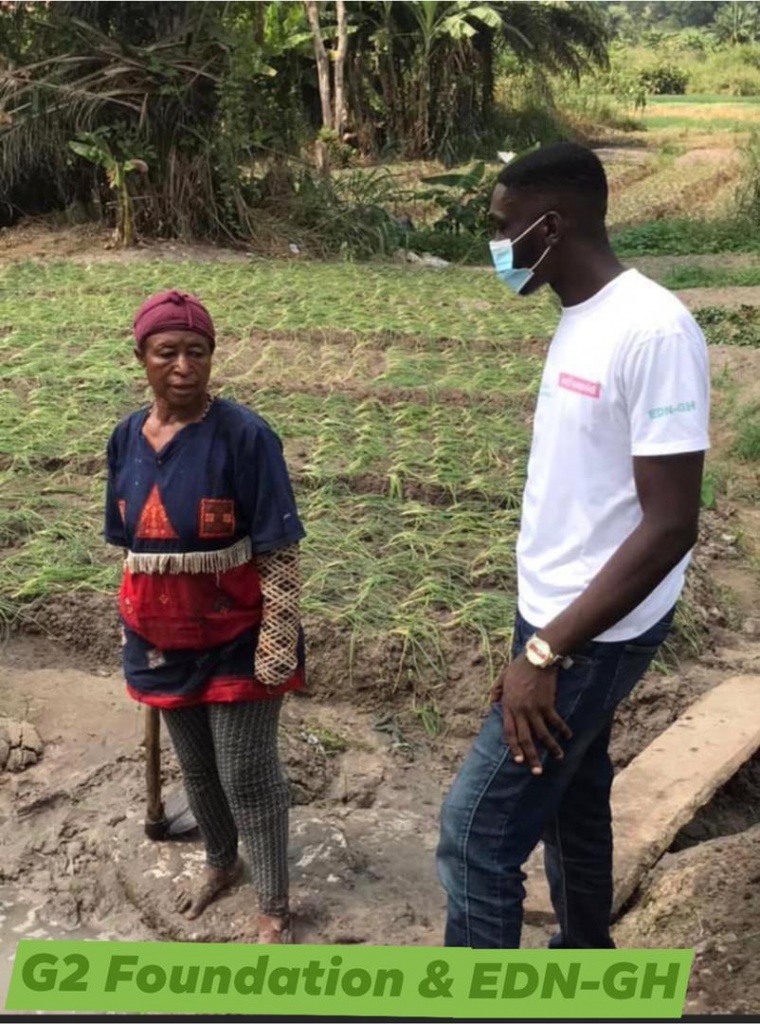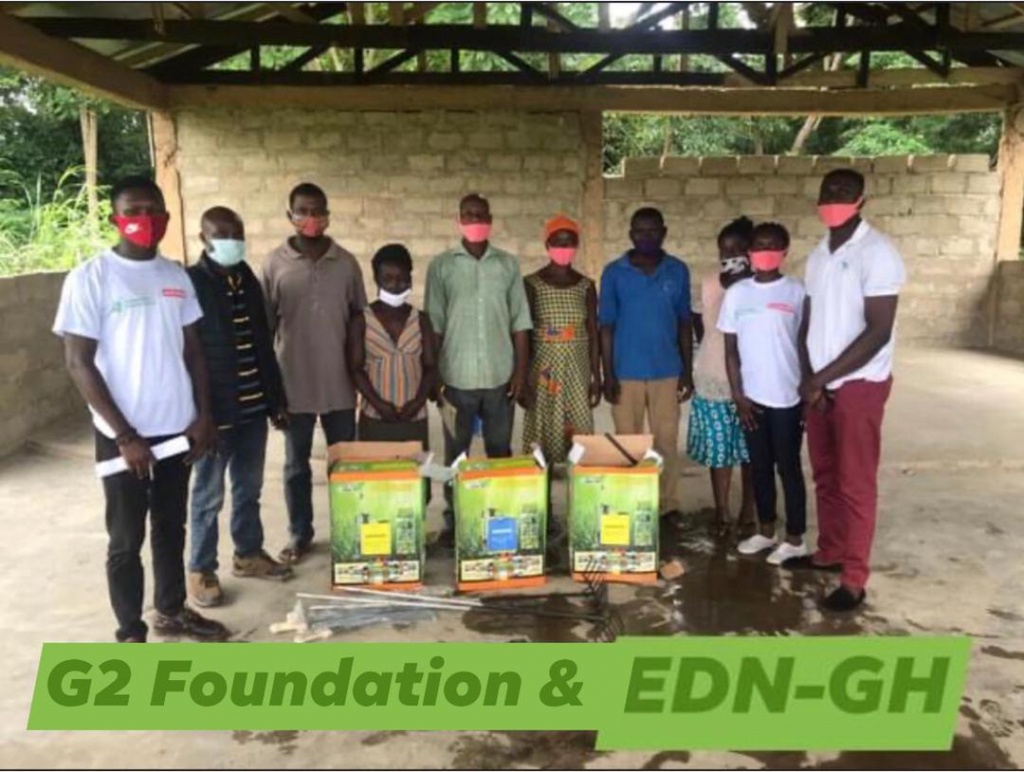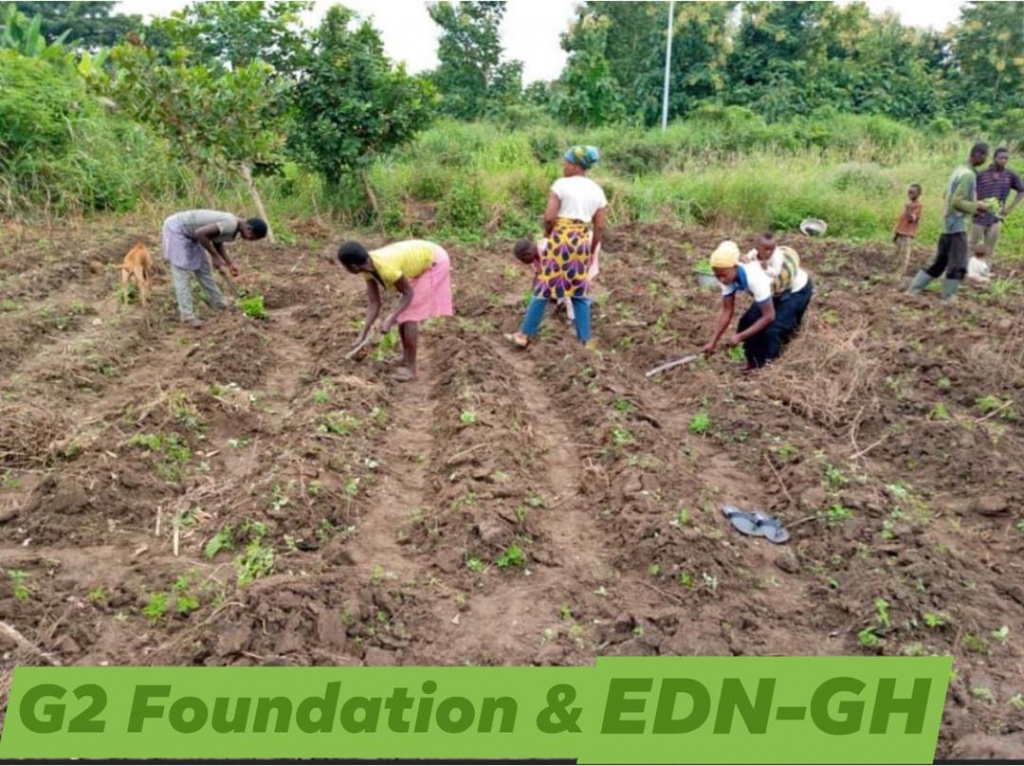Make The Agricultural Sector Attractive To The Youth & Women – Foundation tell Government

Ms Gifty Nyarko, the Sunyani West Municipal physical planning Director and the Chief Executive Officer (CEO) of G2 Foundation has pleaded with the government to put in additional measures to make the agricultural sector attractive to the Youth and Women in Ghana.
She stated that making the agriculture more attractive for young people and having their numbers in that sector would automatically address and change the seemingly poor image of persons involved in farming, particularly in the rural areas and motivate acceptance of farming and general agriculture as lucrative business ventures.
In an interview on food security and sustainability, Ms Nyarko, hinted at a crucial need for financial support for the Ghanaian youth and women to access very soft loans to commence and expand their farming activities and agri-businesses to improve home grown food and enhance food security in Ghana.
She added easy farming land access, affordable prices for farm inputs (prices of seedlings, fertilizers and other agrochemicals), low transport fares from farm gates, ready market for farm produce as well as available processing and storage facilities were key factors not to only motivate farmers, but also attract others to go into farming and agricultural as full times business.

These, together with empowering the African Youth and Women in the smallholder farming business is the way forward to food security achievement, stall importation of consumables and increase employment opportunities, she stressed.
Background
The Food and Agricultural Organization (FAO) of the United Nations (2020) also indicated the agricultural sector is the second largest employer in Ghana.
Given that about 52% of the labour force is engaged in agriculture, 29% in services and 19% in industry and approximate women contribution to the farm labour force is 39%.
On the contribution to Gross Domestic Product (GDP), the FAO said the agricultural sector contributes 54% to Ghana’s GDP and accounts for over 40% of export earnings while at the same time providing over 90% the food needs of the country.
The Statistics Research and Information Directorate (SRID) of the Ministry of Food and Agriculture (MoFA) in 2020 also reported that employments in the agricultural sector is estimated to be more than 38.3 percent, with the Services and Industry sectors accounting for 43.5 percent and 18.2 percent respectively (GLSS7, 2019).
The world’s population is estimated to reach 9 billion by 2050. The proportion of people between the ages of 15 and 24 is also anticipated to increase to 1.3 billion representing 14% of the projected global population by 2050 (UNDESA, 2011: FAO, 2014).
Their 2022 report further stated Africa has the youngest population in the world, with 70% of Sub-Saharan Africa under the age of 30.
Similarly, Ghana’s population is primarily youthful, with young people aged 15 to 24, therefore not surprising that the FAO in 2020 posits that young people between 15 and 24 years are the future of food security in the world.
Consequently, this section of the Ghanaian population is highly anticipated to be the main driver of the Ghanaian economy, especially the agriculture sector on which the sustainability of the economy hinges on.
This assertion duly supported by the United Nations report (2022) postulates that the youthful character of the Ghanaian population is an opportunity for growth, but only if these younger generations are fully empowered to realize their best and full potential.
Agricultural Land Area
According to the FAO, Ghana had about 160000 kilometers square (km2) of land covering approximately 57% total land area of 238,539km2 classified as agricultural land area.
But, in recent decades, the total agricultural land area has seen drastic reduction to 148,236km2 in the year 2011 and to 147,827km2 in their 2018 survey.
In that sense, Ms Nyarko observed that despite intervention by the government in recent years to improve agri-businesses, agricultural land keeps losing its size to residential development.
The phenomenon, she said is resulting in difficult access to land for agricultural purposes coupled with global climate change and other menace gradually engulfing the nation could cause severe food scarcity.

Although there is a high rate of urbanization, the global environment can’t do without food, hence, a crucial need to zone some lands for agriculture purposes (urban agric) to avert the situation of food insecurity in the country.
Ms Nyarko therefore reiterated the need for smart agriculture knowledge and techniques in smallholder farming and agricultural business as other possible ways to improve home grown food systems in Ghana and Africa in general.
The Government`s Policies and beneficiaries
The government of Ghana in 2017 launched the planting for food and jobs project under which there are modules outlined to improve the food system and employment opportunities in the country.
In the Bono region, what is conspicuously missing in the outcome of the policies is the active involvement of the targeted number of young people and women in the sector.
Beneficiaries under the food crops module in the first year of the project (2017) were 20,812 with only 8,681 females against 12,131 males. Under the same food crops module in 2018, a total of 11,361 females benefited from the program against 40,836 males, totalling 52,197 beneficiaries that year.
The female representation keeps decreasing with 21,760 female beneficiaries in 2019 out of a total 68,551 made up of 46,791 males.
The 2020 data was not exception, a total of 105,191 were the beneficiaries under the same food crops module with 72,172 males and a few 33,019 females.
In 2021, there were a total 38,603 beneficiaries of the program with as usual huge 27,695 males against 10,908 fe males.
The situation is not different from the other modules such as Planting for Export and Rural Development (PERD); Rearing for Food and Jobs (RFJ); Greenhouse Technology Development as well as the Mechanization for Food and Jobs in the years under review.
It’s against all this background that Ms Nyarko called for enhanced government and community support systems for families, farmers’ cooperatives, small holder farmers and youth to increase homegrown food systems to avert the situation of severe food shortage.
She stressed the need for capacity building workshops for women and young people in small holder agri-businesses as well as planners zoning lands for agric based activities in both rural and urban areas.
Even though little emphasis has been given in respect of farm land zoning, allocating lands for agricultural purposes and breaking the bias for women’s access to land would quickly respond to counter the threat of food scarcity that may engulf Ghana and Africa in the coming years.
In that regard, Ms Nyarko called for a holistic and workable approach that ensures effective collaboration among government and the private sector actors as the way forward towards building a solid backbone to combat food scarcity that may impose danger on the nation’s economy.
Civil Society Organizations, private actors and opinion leaders should be geared towards agriculture modernization programs and interventions that are youth centered to complement the government’s One District One Factory policy, Planting for Food and Jobs as well as National Farmers day and awards as motivation to help improve production efficiency, achieve food security and profitability for farmers.
These activities are estimated to address the challenge of slow economic growth at the district level to provide cheaper and long-term funding for the growth and expansion of key companies operating in agriculture and propel private sector involvement in the sector.
These would also contribute to the attainment of the United Nations Sustainable Development Goals (SDGs 17, 10, 5, 2, 1), she added.
According to Ms Nyarko, agricultural productivity ought to be seen as a catalyst for industrialization, job creation and export.
The G2 Foundation
In her contribution to materialize the above mentioned, the G2 foundation initiated and has embarked on periodic smart agriculture and modernisation training for youth and women at Tainso and adjoining communities in the Sunyani West Municipality of the Bono region.
The foundation also advocates for youth and women empowerment for sustainable livelihood improvement of its target groups and seeks the holistic welfare of vulnerable people, particularly widows, orphans, persons with Disabilities.
The modernized agric and technological farming training for rural women and youth farmers were on how to make judicious use of the available small piece of land in the Municipality and adjoining communities.
It was a weeklong training organized by the G2 foundation together with the Environmental Dialogue Network and a total of 103 rural farmers made up of 73 youth benefited from the smart agriculture training program.
This, Ms Nyarko was optimistic would “enhance home-grown food security system and contribute immensely to combating climate change”.
She therefore motivated the beneficiaries to form female farmers’ cooperatives and encourage others to support the move towards sustainability in agricultural production.
